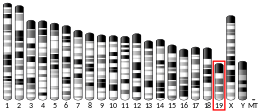Endosialin is a protein that in humans is encoded by the CD248 gene .[ 5] [ 6] [ 7]
Endosialin is a member of the “Group XIV ”, a novel family of C-type lectin transmembrane receptors which play a role not only in cell–cell adhesion processes but also in host defence. This family comprise three other members, CLEC14A, CD93 and Thrombomodulin the latter of which are better characterized. [ 8]
The function of endosialin remains elusive, but its expression has been associated with angiogenesis in the embryo and uterus and in tumor development and growth.[ 9]
^ a b c GRCh38: Ensembl release 89: ENSG00000174807 – Ensembl , May 2017^ a b c GRCm38: Ensembl release 89: ENSMUSG00000056481 – Ensembl , May 2017^ "Human PubMed Reference:" . National Center for Biotechnology Information, U.S. National Library of Medicine .^ "Mouse PubMed Reference:" . National Center for Biotechnology Information, U.S. National Library of Medicine .^ St Croix B, Rago C, Velculescu V, Traverso G, Romans KE, Montgomery E, Lal A, Riggins GJ, Lengauer C, Vogelstein B, Kinzler KW (Aug 2000). "Genes expressed in human tumor endothelium". Science . 289 (5482): 1197–202. Bibcode :2000Sci...289.1197S . doi :10.1126/science.289.5482.1197 . PMID 10947988 . ^ Christian S, Ahorn H, Koehler A, Eisenhaber F, Rodi HP, Garin-Chesa P, Park JE, Rettig WJ, Lenter MC (May 2001). "Molecular cloning and characterization of endosialin, a C-type lectin-like cell surface receptor of tumor endothelium" . J Biol Chem . 276 (10): 7408–14. doi :10.1074/jbc.M009604200 PMID 11084048 . ^ "Entrez Gene: CD248 CD248 molecule, endosialin" .^ Khan KA, McMurray J, Mohammed FM, Bicknell R (2019). "C-type lectin domain group 14 proteins in vascular biology, cancer and inflammation" . FEBS Journal . 286 (17): 3299–3332. doi :10.1111/febs.14985 . PMC 6852297 PMID 31287944 . ^ Rupp C, Dolznig H, Puri C, Sommergruber W, Kerjaschki D, Rettig WJ, Garin-Chesa P (2006). "Mouse endosialin, a C-type lectin-like cell surface receptor: expression during embryonic development and induction in experimental cancer neoangiogenesis". Cancer Immun . 6 : 10. PMID 16875435 .
Rettig WJ, Garin-Chesa P, Healey JH, et al. (1992). "Identification of endosialin, a cell surface glycoprotein of vascular endothelial cells in human cancer" . Proc. Natl. Acad. Sci. U.S.A . 89 (22): 10832–6. Bibcode :1992PNAS...8910832R . doi :10.1073/pnas.89.22.10832 PMC 50436 PMID 1438285 . Opavsky R, Haviernik P, Jurkovicova D, et al. (2001). "Molecular characterization of the mouse Tem1/endosialin gene regulated by cell density in vitro and expressed in normal tissues in vivo" . J. Biol. Chem . 276 (42): 38795–807. doi :10.1074/jbc.M105241200 PMID 11489895 . Strausberg RL, Feingold EA, Grouse LH, et al. (2003). "Generation and initial analysis of more than 15,000 full-length human and mouse cDNA sequences" . Proc. Natl. Acad. Sci. U.S.A . 99 (26): 16899–903. Bibcode :2002PNAS...9916899M . doi :10.1073/pnas.242603899 PMC 139241 PMID 12477932 . Ota T, Suzuki Y, Nishikawa T, et al. (2004). "Complete sequencing and characterization of 21,243 full-length human cDNAs" . Nat. Genet . 36 (1): 40–5. doi :10.1038/ng1285 PMID 14702039 . Gerhard DS, Wagner L, Feingold EA, et al. (2004). "The status, quality, and expansion of the NIH full-length cDNA project: the Mammalian Gene Collection (MGC)" . Genome Res . 14 (10B): 2121–7. doi :10.1101/gr.2596504 . PMC 528928 PMID 15489334 . Brady J, Neal J, Sadakar N, Gasque P (2005). "Human endosialin (tumor endothelial marker 1) is abundantly expressed in highly malignant and invasive brain tumors" . J. Neuropathol. Exp. Neurol . 63 (12): 1274–83. doi :10.1093/jnen/63.12.1274 PMID 15624764 . MacFadyen JR, Haworth O, Roberston D, et al. (2005). "Endosialin (TEM1, CD248) is a marker of stromal fibroblasts and is not selectively expressed on tumour endothelium" (PDF) . FEBS Lett . 579 (12): 2569–75. Bibcode :2005FEBSL.579.2569M . doi :10.1016/j.febslet.2005.03.071 PMID 15862292 . S2CID 11757246 . Dolznig H, Schweifer N, Puri C, et al. (2006). "Characterization of cancer stroma markers: in silico analysis of an mRNA expression database for fibroblast activation protein and endosialin". Cancer Immun . 5 : 10. PMID 16076089 . Tomkowicz B, Rybinski K, Foley B, et al. (2008). "Interaction of endosialin/TEM1 with extracellular matrix proteins mediates cell adhesion and migration" . Proc. Natl. Acad. Sci. U.S.A . 104 (46): 17965–70. doi :10.1073/pnas.0705647104 PMC 2084280 PMID 17986615 . Khan KA, McMurray J, Mohammed FM, Bicknell R (2019). "C-type lectin domain group 14 proteins in vascular biology, cancer and inflammation" . FEBS Journal . 286 (17): 3299–3332. doi :10.1111/febs.14985 . PMC 6852297 PMID 31287944 .




